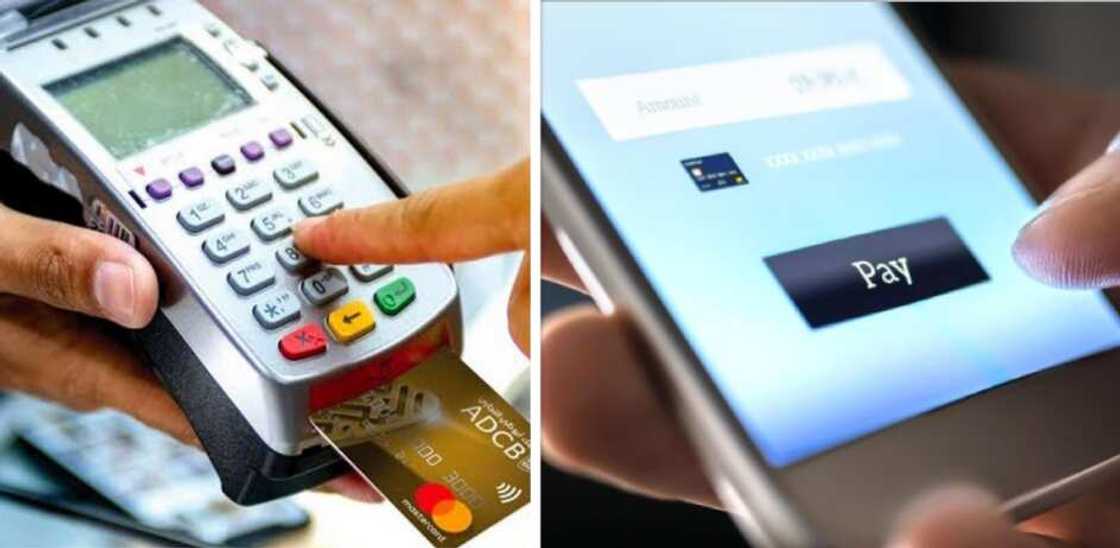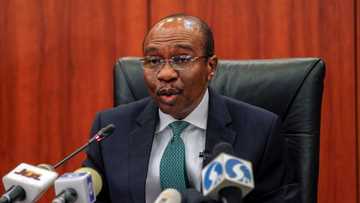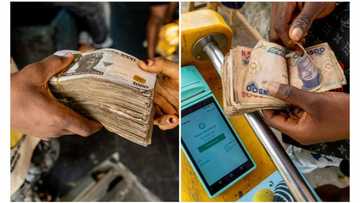Nigerians make N318 trillion worth of cashless transactions between January-November 2022
- Nigeria has made improvements in its plan to fully go cashless in the soonest possible time
- The improvement can be seen in recent policies and in the current statistics provided by the NIBSS for January-November.
- Experts say Nigerians are becoming more aware of the ease and convenience of adopting electronic payment channels
PAY ATTENTION: Сheck out news that is picked exactly for YOU ➡️ find the “Recommended for you” block on the home page and enjoy!
Cashless transactions in Nigeria rose to N318.66 trillion between January and November of 2022, as the Central Bank of Nigeria continues to intensify its cashless policy.
This is according to the Nigeria Inter-Bank Settlement System from data it gathers by monitoring amounts processed Point of Sales terminals (PoS) and the Nigeria Instant Payment System.
The new figure marks a 45.75% increase compared to the N224.79 trillion it recorded in the corresponding period of 2021.

Read also
CBN to review cash withdrawal limit policy, as banks get ready to circulate new naira notes
The new amount, therefore, suggests a strengthened uptick in Nigeria's digital payments as N6.85 trillion was recorded under PoS transactions, while N311.81 trillion was recorded as NIP transactions.

Source: Getty Images
PAY ATTENTION: Follow us on Instagram - get the most important news directly in your favourite app!
Growth in electronic payment
The NIBSS had earlier disclosed in a report that since the COVID-19 pandemic, the adoption of instant payments advanced as bank customers tended to use electronic payment channels to exchange funds while the country was under lockdown.
Even after the COVID lockdown, there was no going back as people were becoming already used to the ease of the alternative system.
The new information comes on the back of the Central Bank of Nigeria’s recent reduction in the cash withdrawal limit for individuals and corporate organizations which is expected to come into effect on January 9, 2023.
Nigeria going cashless
In 2012, the CBN introduced a policy that would encourage the adoption of electronic-based transactions in the payments for goods and services and in the transfer of funds. The policy was also supposed to discourage the handling of cash and decrease the amount of physical cash in the economy.
Benefits outlined in the policy include;
- Drive financial inclusion by providing more efficient transaction options and greater reach.
- To modernize Nigeria's payment system in line with competing economies of the world
- Improving the efficiency of monetary policies in the management of inflation, thereby driving economic development and growth.
- It is hoped that the policy would also help contain the risks involved in the usage of physical cash.
Experts speak on the need to go cashless
Speaking on the reason for the increase in cashless transactions, Hakeem Odulaja, marketing officer at Fidelity Bank told Legit.ng that bank customers were daily becoming aware of the convenience of electronic payments, and the wide use of smartphones and the availability of PoS agents.

Read also
Cash withdrawals limit: How new CBN policy will send us out of business, POS agents cry out as experts react
Today, we have PoS agents in almost the streets of major cities in the country where you can afford to make all types of fund transfers and withdrawals. There's also the factor of the wide use of smartphones today from which you can also do a lot of transactions and not necessarily have to visit a physical bank.
Also speaking on the same matter, Cynthia Odolor, a bank customer said she has not entered a banking hall in almost two years because she explores alternative channels like PoS, ATMs and her bank app for all types of transactions.
We are all aware of the sometimes foot-dragging in banking halls. Whatever I need to do, I have channels like the ATMs, PoS available to me and they are almost everywhere. For transfers, I can do that via my smartphone via my bank app. So I guess I can go cashless unless it's very necessary to keep cash with me.
New cashless policies force hoarders to reveal naira
Since the CBN issued a deadline for old naira notes to be deposited in banks across the country, several denominations of the naira printed as far back as two decades ago have resurfaced.
It would be recalled that even some of the banks have reiterated the January 31, 2023 deadline in emails and text messages to their customers, to either deposit the old naira notes or risk rejection.
As a consequence to the hoarding of the naira, several social videos have captured naira amounting to thousands and sometimes millions destroyed by the forces of nature.
One video showed defaced and rotten naira notes that were stored in bags, while another video showed damaged naira notes loaded in a truck allegedly in a place in the northern part of the country.
Source: Legit.ng




